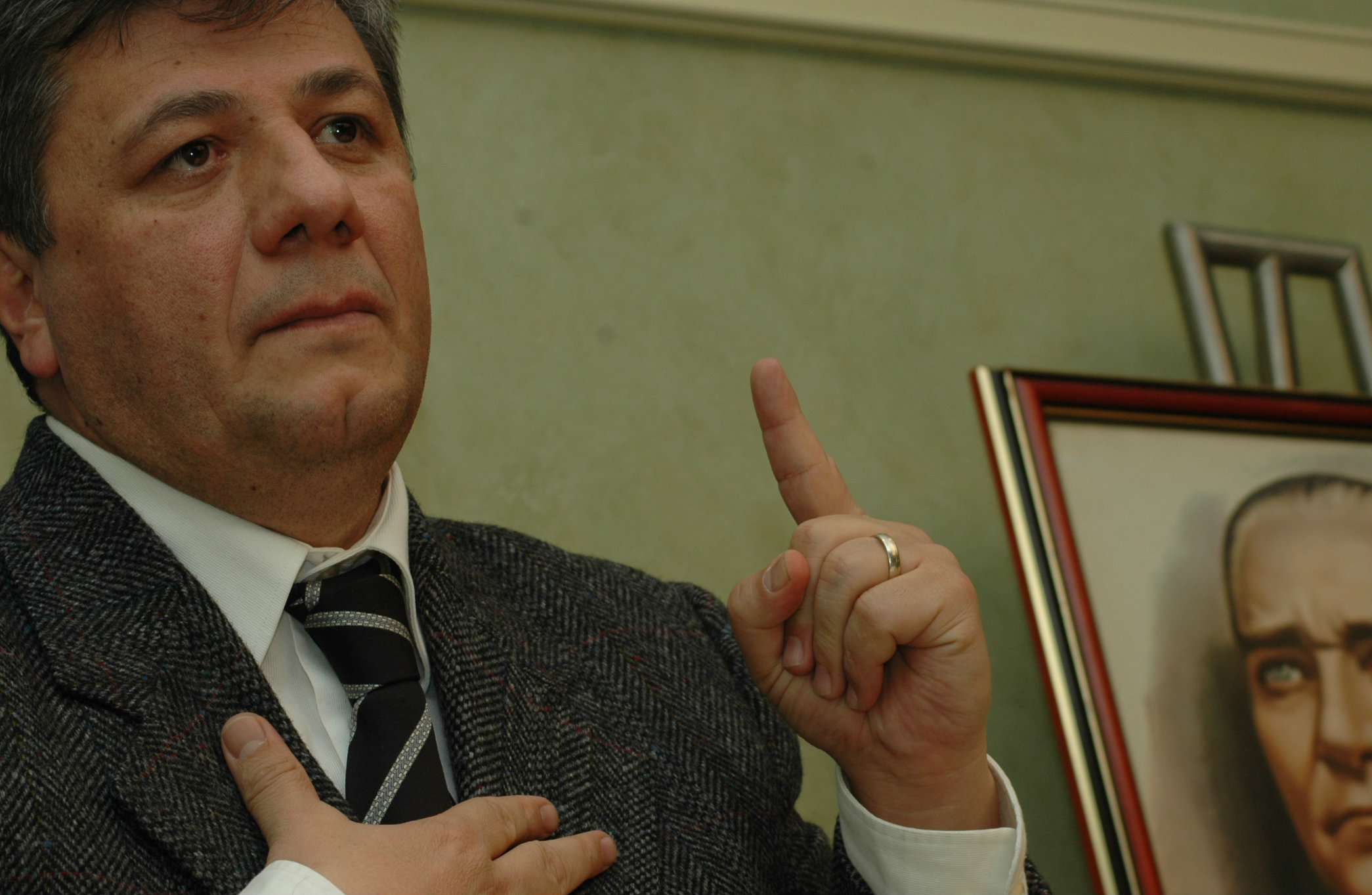Turkey Offers Great Opportunities for IT Investments
Information technology (IT) is rapidly changing both the personal and social aspects of people’s lives. This change creates information society.
Global competition quickly affects information technology because information-based societies and IT affect every aspect of life from the economy to socio-cultural values and manifest as either benefits for or deficiencies of countries.
Down below you will find an interview with head of the Information Society Department at the Ministry of Development.
The interview was originally published on TODAYS ZAMAN internet site.
INTERVIEW ABOUT IT SECTOR IN TURKEY
Emin Sadık Aydın, head of the Information Society Department at the Ministry of Development, explained in an interview with Today’s Zaman that reaching IT targets constitutes a major area of competition between countries. “Progress in IT has become an indispensable condition of being ahead in global competition, increasing production efficiency and providing higher quality services. Without attaining those IT targets, it would be increasingly difficult for countries to achieve their other goals,” he said.
Acknowledging that “there is still need for much progress,” Aydın explained that Turkey’s current IT projects and its rapid evolution as an information society offer great opportunities for investors.
Where does Turkey, with its ambitious targets for 2023, stand as an information society? To what extent has it achieved its targets as set out in the Information Society Strategy for the period of 2006-2010? Why are exports from the IT sector so low? Does the current state of the IT sector equate well with the target of reaching an export volume of $500 billion by 2023? We posed these questions and more of Aydın.
Turkey as an information society
What is Turkey’s current position as an information society and with respect to its IT sector?
“Our lives are changing in line with changes in information technologies. Are only our individual behaviors changing? No. These changes affect our entire lives. And these changes are comprehensive in that if you refuse to make use of information technologies, your competitiveness diminishes — no matter how big a company or country you are. The use of IT, on the other hand, changes lives extraordinarily. This IT-induced change happens in all sectors, ranging from the most modern to even the most traditional, and actually reflects the economic dimension of what we call information society. Turkey, too, experiences this process. There are social and cultural aspects to IT-related change.”
Does the government also step in to work for considerable changes in IT?
“The government is part of the process as it contributes to how public policies are shaped. Countries are working intensively on information societies. Some focus on the IT sector, while others pay greater attention to its use by citizens and yet others concentrate on how IT transforms other sectors.”
What does Turkey do?
“Actually, in the 1980s, the Postal and Telecommunications General Directorate (PTT) tried to make the use of telecommunications widespread. Turkey is capable of quickly adopting changes in technology. The state has undertaken several long-term projects. For instance, the Address-Based Central Population Registration System [MERNİS] project started 30 or 35 years ago. The Finance Ministry, Customs, the police department and the like widely use such technologies [as MERNİS]. In the early 2000s, we began to deal with IT projects in a tidier manner. First, the Prime Ministry launched the “e-Turkey” initiative.”
Guidelines from the government
Society is inclined to use technology, but does the government provide any guidelines?
“The government does that mostly for its own institutions. The e-Turkey project remains officially valid. One of the major aims of this project is strategy. Why was the 2006-2010 Strategy Plan so important? It was the first plan about information society strategy in Turkey.”
Have the targets of the 2006-2010 Strategy Plan been sufficiently achieved?
“Its targets are summarized into 111 actions. These actions collectively make up the targets, which include such items as the rate of Internet use, broadband ownership and the overall size of the IT sector. About two-thirds of these 111 actions have been successfully implemented. There are deficiencies, but when they are overcome, Turkey will make rapid progress.”
Some people criticize that the process is not adequately coordinated and that the growth of the sector is not ensured.
“These criticisms have some validity. The strategy document suggests that a new structure for IT is needed. This structure is extremely important as it determines who is responsible for what, etc. True, the state may be sluggish in properly driving IT change.
The strategy document envisaged a structure but couldn’t implement it. It suggests that an Information Society General Directorate should be established. This proposal became part of the official document and made it into a bill that was discussed in Parliament but was not enacted. The General Directorate could not be established. 2009 saw debates concerning the establishment of an information society agency. The government prepared a bill for authorizing the Ministry of Transportation to conduct e-government projects.
There are debates as to which institution should be in charge. These debates justify the criticisms.
“The sector is demanding a single structure. With a better structure, Turkey will make progress faster.”
Are you implying there should be a new restructuring with new ministries, and only after that happens will rapid progress be made?
“Yes; one of the changes that has been made is the conversion of the State Planning Organization [DPT] into the Development Ministry. The duties of this ministry include ‘setting forth and coordinating the targets of the Information Society Strategies.’”
Tacking structural problems enough?
Is this change enough?
“I cannot say that tackling these structural problems will make everything perfect. Everything rests on the dynamism of society and the sector. A young society and an entrepreneurial sector will keep this dynamism alive. Our success with regards to the EU information technologies grant for 2011 [ICT] is attributable to this dynamism. When bureaucracy coordinates and paves the way, the private sector’s dynamism pushes public institutions forward. Jointly prepared projects secured the EU grant. The success in these projects is owed to the dynamism of the IT sector and society.”
How will the gap between Turkey’s technology use and the use by rival countries be eliminated?
“Unfortunately, we are a bit behind in this respect. For instance, we are about 20 percent behind the EU with respect to Internet usage [40 percent versus 60 percent]. However, we have closed the gap in terms of persistent Internet use [among those who do use it], and we have even passed them. Here, the advantage of having a young population steps in with important messages.”
What are those messages?
“We discovered the Internet in 2002. We love it now with the expansion of broadband. We move our businesses, friendships and communications to the Internet. The number of regular users will continue to grow rapidly. In the near future, Turkey will make use of these technologies more intensively. Compared with the EU’s aging population, Turkey will make greater progress. The Internet is just one indicator and there has also been a big increase in e-commerce. Another striking indicator is small and medium-sized enterprises [SMEs]. We are in a better position than European countries in terms of broadband Internet use and SME website ownership.”
Politicians should step in
To what extent do the 2023 targets overlap with the process of developing the information society?
“Turkey’s lofty goals can only be fulfilled by a powerful IT sector. First of all, the growth of the IT sector itself will generate added value. The IT sector has to grow beyond its boundaries in Turkey. If the country aims to boost its exports to $500 billion by 2023, then the IT sector must undergo parallel growth. Second, the IT sector must support other sectors so that the country can grow and other targets can be achieved. I am talking about software support, increased productivity and new forms of business. Public investments in new projects are on the rise. The dynamism of the sector and society and their potential do not escape the attention of investors. Current trends indicate that local and foreign investors will invest more heavily in Turkey’s growing IT market. The IT sector will grow rapidly in order to meet the increased demand in the country and satisfy its 2023 targets.”
What do you say about Turkey’s image as a country that practices censorship?
“There are heated debates about the security of the Internet and the filtering of content. Our image as a censor-loving country does not suit us. The Internet is already a technology that does not play nicely with bans. The infrastructure of the Internet was invented in the quest for alternative methods of communication and, accordingly, the notion of censorship and bans cannot be reconciled with the nature of the Internet.”
But we have bans in place, don’t we?
“True, and we face with this criticism in our talks abroad. Turkey is suffering from the dilemma as to how it will proceed with information technologies. If the Internet had been perceived on a wider scale, and if the benefits we gain through its proper use had been recognized, we would be planning to implement programs on a wider scale. But bans were introduced due to certain reactions people had.”
What will happen now?
“We have to criticize ourselves over our approach to the removal of bans. Internet bans became taboo and people started to wait for an automatic solution to the problem. The legislation concerning bans is still in place. This matter is still on the agenda but is a soft spot. Politicians should step in. This matter is becoming more and more delicate. There are some de facto solutions, however. The YouTube ban has been partially solved. Unfortunately, laws are trailing behind technology.”
New action plan to be drafted in 2012
The first action plan expired last year. Isn’t it high time a new plan was developed?
“We are responsible for updating information society strategy. I hope 2012 will be the year that this updating will be performed. When the state creates awareness through such projects, the sector’s participation grows. It brings about motivation for new projects. Turkey has major IT projects. I regard this as an opportunity. Here, the opportunity is represented by the projects themselves, for the sector, the country and society.”
It seems the distribution of tablet PCs to students will trigger further development.
“Exactly. Fatih is an important project in this respect. Tablet PCs will be introduced to homes via more than 10,000 students. This will affect a large portion of society, having both social and economic effects. There are other projects as well.”
They will be accompanied by some disadvantages?
“Disadvantages accompany every unknown. To better manage the process, we need to decrease the unknown. I do not ignore the disadvantages. Politicians and civil society organizations [CSOs] have big roles to play.”
Do you think that CSOs lend sufficient support?
“Information society needs a much stronger voice. The CSOs are weak with respect to the information society process. We need to create accurate perceptions about the projects that affect individual citizens. IT must be a political project. There are such countries in the world. They try to take the lead through gigantic transformation projects with the help of politicians. There is still much progress that we must make.”
29 August 2011
SOURCE: TODAYS ZAMAN




